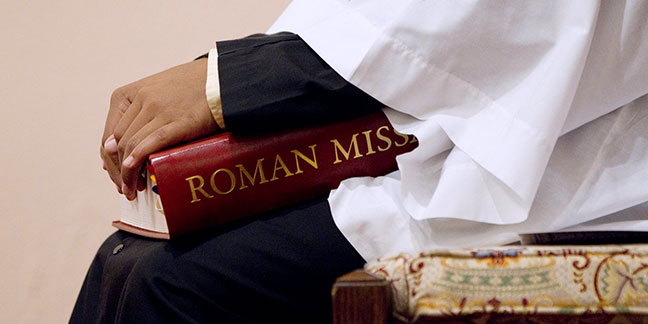 WASHINGTON, D.C. — A correction to the English translation to the concluding doxology of orations in the Roman Missal, from “one God, for ever and ever” to “God, for ever and ever,” took effect on Ash Wednesday, Feb. 17.
WASHINGTON, D.C. — A correction to the English translation to the concluding doxology of orations in the Roman Missal, from “one God, for ever and ever” to “God, for ever and ever,” took effect on Ash Wednesday, Feb. 17.
A Feb. 4 memo to bishops from the U.S. Conference of Catholic Bishops’ Committee on Divine Worship said the Vatican Congregation for Divine Worship and the Sacraments wrote to the English-speaking bishops’ conferences in May 2020 to point out the current English translation that concludes “in the unity of the Holy Spirit, one God, for ever and ever” is “incorrect.”
Until now, in the conclusions to collects the Latin words “Deus, per omnia sæcula sæculorum” had been incorrectly rendered in English as “one God, for ever and ever.”
“There is no mention of ‘one’ in the Latin, and ‘Deus’ in the Latin text refers to Christ. Therefore, the correct translation ... is simply “in the unity of the Holy Spirit, God, for ever and ever,” the memo said, adding that the prefect of the congregation “pointed out the importance of affirming this Christological truth amid the religious pluralism of today’s world.”
The most common formula, used when a collect is addressed to the Father, will read: “Through our Lord Jesus Christ your Son, who lives and reigns with you in the unity of the Holy Spirit, God, for ever and ever.”
The memo said this correct translation was already reflected in the Roman Missal in other languages.
English translations of the Roman Missal for use by Catholics prior to the Second Vatican Council “reflected the correct translation,” the memo noted.
“However, when the postconciliar texts were published in English, the word ‘one’ was added.”
When the translation of the Roman Missal currently in use was underway in the 2000s, the International Commission on English in the Liturgy “pointed out the discrepancy to the congregation in Rome, but was told to retain the use of ‘one God’ in the new translation,” according to the memo.
After the doctrinal congregation’s directive last May, the USCCB’s Latin-rite bishops voted to amend the concluding doxology of orations, or “collects,” of the Roman Missal to reflect the translation change. The congregation confirmed the decision, as it had for the episcopal conferences of England and Wales, Ireland and Canada.
In an explanatory note to the English and Welsh decree, it was explained that the addition of “one” before “God” “could serve to undermine the statement of the unique dignity of the Son within the Trinity,” or “could be interpreted as saying that Jesus is ‘one God.’”
“Either or both of these interpretations is injurious to the faith of the Church.”
Continuing, the note said that “one” “risks suggesting that Jesus became a god independent of the Blessed Trinity and is one god among many ... what we pray needs to express what the Church believes, requiring that, in liturgical formulae, we uphold the doctrine of the Blessed Trinity.”
The Trinitarian doxology that concludes the collects “emphasizes the divinity of Our Lord Jesus Christ, the Second Person of the Blessed Trinity, who as the Incarnate Son, intercedes on our behalf to the Father ... thus, the Son’s role of priestly mediation is made clear.”
The translation change applies to other liturgical books, such as the Liturgy of the Hours, the memo said, adding that there is no need to publish new Roman Missals, because “it should not be difficult for the celebrant simply to omit the word ‘one’ when offering the prayer.”
But it added that publishers “are being informed of this change” and reprints or new editions of the Roman Missal will reflect the new translation, as will any worship aids for the faithful and other similar publications.
— Catholic News Service and Catholic News Agency
Pictured: An altar server holds a copy of the Roman Missal during Mass at St. Joseph Church in Alexandria, Va., in this 2011 file photo. (CNS | Nancy Phelan Wiechec)


